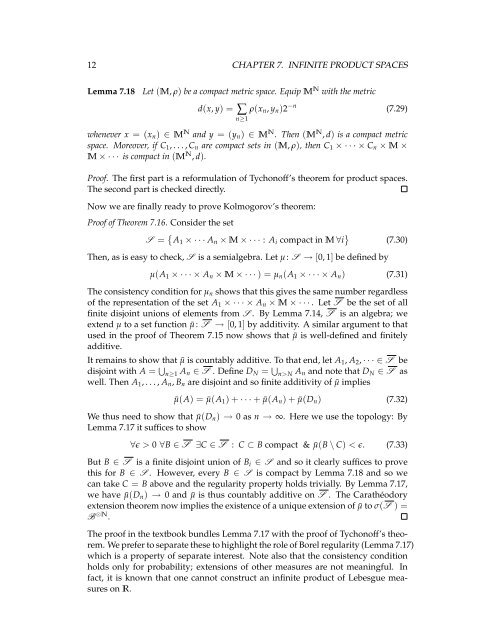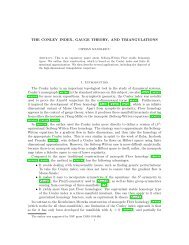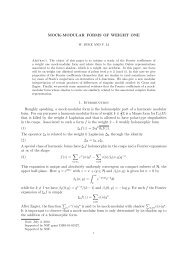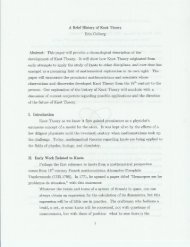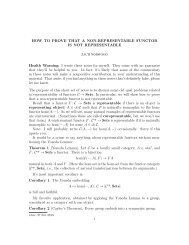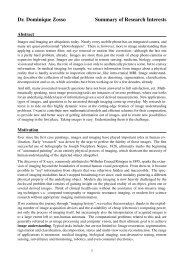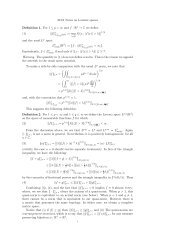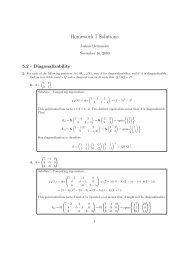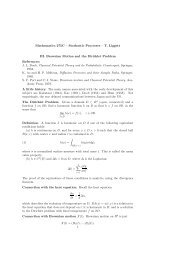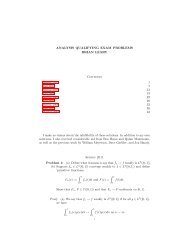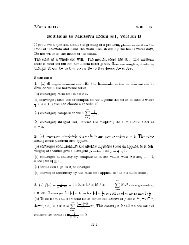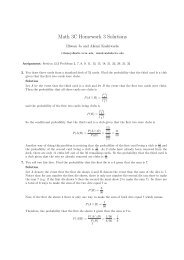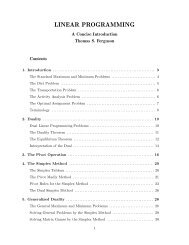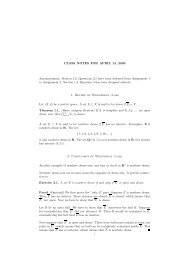Create successful ePaper yourself
Turn your PDF publications into a flip-book with our unique Google optimized e-Paper software.
12 CHAPTER 7. INFINITE PRODUCT SPACES<br />
Lemma 7.18 Let (M, r) be a compact metric space. Equip M N with the metric<br />
d(x, y) =Â r(xn, yn)2<br />
n 1<br />
n<br />
(7.29)<br />
whenever x =(xn) 2 M N and y =(yn) 2 M N . Then (M N , d) is a compact metric<br />
space. Moreover, if C1,...,Cn are compact sets in (M, r), then C1 ⇥···⇥Cn ⇥ M ⇥<br />
M ⇥··· is compact in (M N , d).<br />
Proof. The first part is a reformulation of Tychonoff’s theorem for <strong>product</strong> <strong>spaces</strong>.<br />
The second part is checked directly.<br />
Now we are finally ready to prove Kolmogorov’s theorem:<br />
Proof of Theorem 7.16. Consider the set<br />
S = A1 ⇥···An ⇥ M ⇥···: Ai compact in M 8i<br />
Then, as is easy to check, S is a semialgebra. Let µ : S ! [0, 1] be defined by<br />
(7.30)<br />
µ(A1 ⇥···⇥An ⇥ M ⇥···)=µn(A1 ⇥···⇥An) (7.31)<br />
The consistency condition for µn shows that this gives the same number regardless<br />
of the representation of the set A1 ⇥···⇥An ⇥ M ⇥···. Let S be the set of all<br />
finite disjoint unions of elements from S . By Lemma 7.14, S is an algebra; we<br />
extend µ to a set function ¯µ : S ! [0, 1] by additivity. A similar argument to that<br />
used in the proof of Theorem 7.15 now shows that ¯µ is well-defined and finitely<br />
additive.<br />
It remains to show that ¯µ is countably additive. To that end, let A1, A2, ···2S be<br />
disjoint with A = S<br />
n 1 An 2 S . Define DN = S<br />
n>N An and note that DN 2 S as<br />
well. Then A1,...,An, Bn are disjoint and so finite additivity of ¯µ implies<br />
¯µ(A) = ¯µ(A1)+···+ ¯µ(An)+ ¯µ(Dn) (7.32)<br />
We thus need to show that ¯µ(Dn) ! 0 as n ! •. Here we use the topology: By<br />
Lemma 7.17 it suffices to show<br />
8e > 0 8B 2 S 9C 2 S : C ⇢ B compact & ¯µ(B \ C) < e. (7.33)<br />
But B 2 S is a finite disjoint union of Bi 2 S and so it clearly suffices to prove<br />
this for B 2 S . However, every B 2 S is compact by Lemma 7.18 and so we<br />
can take C = B above and the regularity property holds trivially. By Lemma 7.17,<br />
we have ¯µ(Dn) ! 0 and ¯µ is thus countably additive on S . The Carathéodory<br />
extension theorem now implies the existence of a unique extension of ¯µ to s(S )=<br />
B ⌦N .<br />
The proof in the textbook bundles Lemma 7.17 with the proof of Tychonoff’s theorem.<br />
We prefer to separate these to highlight the role of Borel regularity (Lemma 7.17)<br />
which is a property of separate interest. Note also that the consistency condition<br />
holds only for probability; extensions of other measures are not meaningful. In<br />
fact, it is known that one cannot construct an infinite <strong>product</strong> of Lebesgue measures<br />
on R.


